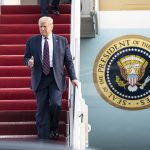President Trump has made headlines this week with the announcement of new tariffs aimed squarely at combating the flow of illicit substances into the United States. In a bold move, he eliminated trade exemptions with China and Hong Kong, a decision that reflects both his commitment to national security and his disdain for deceptive trade practices. This is not merely a day of policy changes; it’s what Trump has dubbed “Liberation Day”—a name that demands attention.
The elimination of the “duty-free de minimis” treatment signifies a serious shift in how America handles imports valued at $800 or less. This previously enjoyed perk allowed small shipments to glide through customs with little scrutiny. However, under Trump, the administration has called out the Chinese for exploiting this loophole by chopping large shipments into smaller parcels, effectively hiding their nefarious cargo of drugs. With this new directive, even small packages will now face tariffs, ensuring that America can better protect itself from unwanted imports that fuel the opioid crisis.
President Donald Trump eliminated trade exemptions with China and Hong Kong this week to combat illicit substance imports.https://t.co/JI8MONgcdy
— Ricardo J Vidal (@rvidal0110) April 5, 2025
This tariff plan is more than just a punitive measure; it’s a calculated strategy designed to level the playing field. As trade reporter John Carney from Breitbart pointed out, there’s an ongoing disparity in how American manufacturers are treated compared to their European counterparts. American companies often face layers of taxation when exporting goods, while European firms enjoy rebates that make it easier for them to compete in the U.S. market. Trump’s actions directly challenge this inequity, signaling that America’s trade policies are about to undergo serious scrutiny.
Critics might grumble about the economic ramifications, but it’s hard to find a decent argument when national security is on the line. The administration’s steady drumbeat about America’s fight against drugs aligns perfectly with this new directive. By tightening the screws on trade exemptions, Trump is sending a clear message: the U.S. will no longer turn a blind eye while other countries profit from addiction and suffering.
In the end, Trump’s commitment to reform isn’t just about tariffs; it embodies his broader philosophy of putting America first. The more the populace can align with this vision—showing that tough stances lead to tangible results—the stronger the resolve will be to stand against unfair trade practices from abroad. This isn’t merely policy; it’s a movement towards reclaiming American integrity and health, one tariff at a time.




